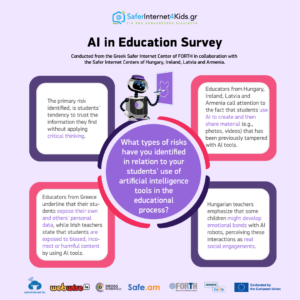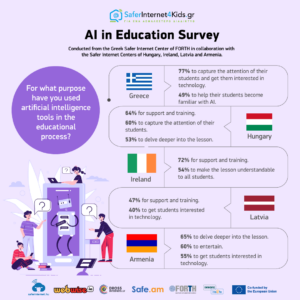AI in Education Survey
Artificial Intelligence (AI) has become prevalent across all levels of education. AI in education (AIEd), referred to a wide range of systems and tools that mimic human intelligence and serve various educational purposes, like teaching assistants, course creation tools, chatbots, image and video generation, audio, research, animation, text-to-speech, presentations, etc. Understanding teachers’ beliefs about AIEd is essential for its effective integration into the educational system.
 The present survey about AIEd is an overview of teachers’ use of AI and examines how AI can effectively support teaching. Conducted from the Greek Safer Internet Center of FORTH in collaboration with the Safer Internet Centers of Hungary, Ireland, Latvia, and Armenia, and with the support of the European Network of Safer Internet Centers, Insafe, it represents a significant international effort. The study took place between October 2023 – March 2024 and was performed through an online questionnaire and attracted 1754 responses from all participating countries. All questions and responses in the questionnaire were provided in the national language of each country to ensure maximal level of clarity and understanding for all participants.
The present survey about AIEd is an overview of teachers’ use of AI and examines how AI can effectively support teaching. Conducted from the Greek Safer Internet Center of FORTH in collaboration with the Safer Internet Centers of Hungary, Ireland, Latvia, and Armenia, and with the support of the European Network of Safer Internet Centers, Insafe, it represents a significant international effort. The study took place between October 2023 – March 2024 and was performed through an online questionnaire and attracted 1754 responses from all participating countries. All questions and responses in the questionnaire were provided in the national language of each country to ensure maximal level of clarity and understanding for all participants.
The questionnaire was divided into three thematic parts. The first focused on gathering demographic information about the educators, including their experience, the grades they teach and their place of residence. The second part of the questionnaire explored the current landscape of AIEd. Educators were asked about their integration of AI tools into their teaching practices and their individual comfort levels with AI technologies. This part also explored the perceived benefits of AI in enhancing teaching and learning experiences, and the challenges and barriers educators face. Finally, the third part focused on the future of AIEd and if it potential to transform teaching and learning.
current landscape of AIEd. Educators were asked about their integration of AI tools into their teaching practices and their individual comfort levels with AI technologies. This part also explored the perceived benefits of AI in enhancing teaching and learning experiences, and the challenges and barriers educators face. Finally, the third part focused on the future of AIEd and if it potential to transform teaching and learning.
The main findings of the survey are as follows:
-
- Current Understanding and Utilization: Educators across most surveyed countries report a solid understanding of AI technology and acknowledge its potential risks. Most educators from Greece, Ireland and Armenia state that they use AI tools in that use AI the educational process. AIEd is primarily used for educator support and, training for Greece, Hungary, Ireland, and Latvia and but also engaging students in the classroom, with minimal use in administrative functions and delve deeper into the lesson and to entertain students (Armenia). Concerning student usage, educators indicate that students mainly use AI to manage their academic workload, such as completing homework effortlessly. Beyond school, educators report that AI tools are primarily used by students for entertainment purposes for Greece, Hungary, Ireland, Latvia, and Armenia. Educators also express concerns about the impact of AI on fostering critical thinking and the exposure of students to biased data for all the aforementioned countries.
-
- Risks: Considering whether they are aware of the risks for students associated with this technology, across all countries, most educators seem to be aware of the risks and raise ethical concerns. Concerning specific risks, in all countries the primary risk identified is students’ tendency to trust the information they find without applying critical thinking. Second comes that students are exposed to biased, incorrect or harmful content. Educators from Greece, Hungary, Ireland and Armenia also call attention to the fact that students use AI to create and then share material (e.g., photos, videos) that has been previously tampered with AI tools, which of course encloses the issue of ethical use of AI. What’s more, educators from Ireland are concerned that students are exposed to biased, incorrect or harmful content. Overall, most educators who use these systems agree that there are mechanisms in place to ensure that personal and sensitive personal data are adequately protected.
-
- Benefits: According to our survey, educators unanimously believe that one of the positive effects AI will have in the future is its potential to support educators’ work. Another positive impact they foresee is its potential to facilitate personalized learning experiences for students. Furthermore, most teachers believe AI will reduce their administrative tasks, allowing them to invest more time in teaching and mentoring students.
-
- Concerns and Ethical Issues: Despite their optimism, educators across all countries express significant concerns about AI’s impact on fostering critical thinking (Greece 63%, Hungary 64%, Ireland 70%, Latvia 76%, and Armenia 46%) and raise ethical concerns about the potential misuse of AI and the exposure of students to biased and inappropriate information. Therefore, educators emphasize the necessity for professional development to enhance their knowledge and skills, through training seminars, workshops, and specialized online courses to effectively integrate AI into their teaching practices (Greece 88%, Hungary 67%, Ireland 99%, Latvia 80%, and Armenia 89%).
-
- Greek Data Analysis: A deeper analysis of the Greek data reveals that younger educators are more likely to be tech-savvy and have experience using AI tools. Gender also influences familiarity with technology, with male educators being more familiar with technology tools, while female educators having experiment more with AIEd tools.
Overall, the findings highlight a cautious optimism among educators regarding the integration of AI in education. There is a clear demand for targeted professional development to address their concerns and enhance their skills in utilizing AI tools effectively.





